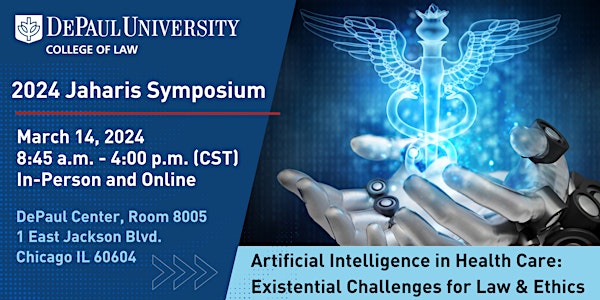
2024 Jaharis Symposium
Artificial Intelligence in Health Care: Existential Challenges for Law & Ethics
Date and time
Location
DePaul Center
1 East Jackson Boulevard Room 8005 and Online Chicago, IL 60604Refund Policy
About this event
2024 Jaharis Symposium
Artificial Intelligence in Health Care: Existential Challenges for Law & Ethics
March 14, 2024
8:45 a.m. - 4:00 p.m. (CST)
In Person & Online
DePaul Center, Room 8005
1 East Jackson Boulevard
Chicago, Illinois
Each year, the Mary and Michael Jaharis Health Law Institute, in collaboration with the College of Law's Center for Intellectual Property Law & Information Technology, explores a critical legal issue at the intersection of health law, intellectual property law, and information technology.
This year’s program is no exception as we dive deeper into the role and impact of large language model artificial intelligence (AI) technologies and the radical changes they are making to medical innovation and practices. This topic lends itself to the interdisciplinary nature of the Jaharis Symposium, as we gather a wide range of academics, legal practitioners, and health care professionals to discuss the challenges and opportunities introduced by developments in AI.
Panel 1 – Foundational Knowledge: What Lawyers Need to Know About AI Capabilities and the Current State of AI in Health Care
This set of speakers will cover the fundamentals of AI technologies and how they have begun to be employed in the medical field. Particular attention will be given to discussing the different ways in which these technologies obtain, analyze, and use patient data. The panel will then discuss some of the problems that have manifested in AI systems including predictive errors, hallucinated sources and results, and inappropriate biases.
Bamshad Mobasher, Professor, Jarvis College of Computing and Digital Media, DePaul University
Roselyne Tschoua, Assistant Professor, Jarvis College of Computing and Digital Media, DePaul University
Casey Bennett, Assistant Professor, Jarvis College of Computing and Digital Media, DePaul University
Moderator: Anthony Volini, Professor of Legal Practice, DePaul University
Panel 2 – Discriminatory Care: How AI Can Reinforce Biases, Threaten Privacy and Drive Treatment Inequity
This set of speakers will discuss the benefits and detriments associated with the incorporation of AI into the practice of medicine and the delivery of health care services. More specifically, this panel will discuss limitations on provider access and use of AI technologies; how algorithmic AIs can replicate and exacerbate inaccurate biases; the extent to which the use of AI changes traditional approaches to protecting patient privacy; and the effects AI may have on existing inequities in the treatment context.
Fazal Khan, Professor, Meharry Medical College School of Global Health
Cristina Messerschmidt, Senior Associate, Global Data Privacy and Security, Baker MacKenzie
Dr. Kunal Paritosh Patel, Director of Informatics, Visiting Professor of Emergency Medicine, Physician Advisor, and Liaison to the Center of Health Equity Using Machine Learning and Artificial Intelligence (AI.Health4All), University of Illinois Chicago
Moderator: Max Helveston, Associate Dean for Academic Affairs & Strategic Initiatives and Associate Professor of Law, DePaul University
Panel 3: The Legal Risks of AI-Driven Innovation in the World of Medicine
This set of speakers will address the use of AI to develop vaccines, therapeutics, diagnostics, and medical devices, and in the biopharmaceutical industry, generally. The panel will focus on how AI is changing medical technology development and funding needs, new regulatory concerns with the use of AI, and intellectual property concerns that will arise with the use of AI in medical technology development.
Ana Santos Rutschman, Professor of Law, Villanova University, Charles Widger School of Law
Ryan Phelan, Partner, Marshall, Gerstein & Borun LLP
Jason Derry, Associate General Counsel, Intellectual Property, Synthego Corporation
Moderator: Joshua Sarnoff, Professor of Law, DePaul University
Panel 4: Ethical Implications of AI-Centered Health Care: Informed Consent, Telemedicine and Medical Malpractice
This set of speakers will address the ethical implications of using AI in health care. The panel will focus on the effects of AI on informed consent, how AI can be ethically used in telemedicine, and concerns with the use of AI in regard to medical malpractice and liability.
I. Glenn Cohen, Deputy Dean and James A. Attwood and Leslie Williams Professor, Harvard Law School
Thomas R. Mulroy, III, Partner, Salvi, Schostock & Pritchard P.C.
Dr. David Liebovitz, Associate Vice Chair for Clinical Informatics, Department of Medicine; Co-Director, Institute for Augmented Intelligence in Medicine, Center for Medical Education in Data Science and Digital Health; Associate Professor of Medicine (General Internal Medicine) and Preventive Medicine (Health and Biomedical Informatics), Northwestern University Feinberg School of Medicine
Moderator: Wendy Epstein, Associate Dean of Research & Faculty Professional Development and Professor of Law, DePaul University
Distinguished Speaker: The Future of AI in Health Care and Implementation of the President’s Executive Order
Samuel Bagenstos, General Counsel, U.S. Department of Health and Human Services, on leave as the Frank G. Millard Professor of Law and Arlene Susan Kohn Professor of Social Policy, University of Michigan
There is a room cap of 100 in-person attendees, and online participants will receive a link to view the presentation just ahead of the event. No proof of vaccination is required of guests and masks are optional.
You may be asked to show your ID while on campus. We know your time is valuable, and we appreciate your patience and cooperation.
DePaul College of Law is an accredited MCLE provider. This event is eligible for up to 6 hours of general CLE credit, which includes 1 hour of professional responsibility credit.